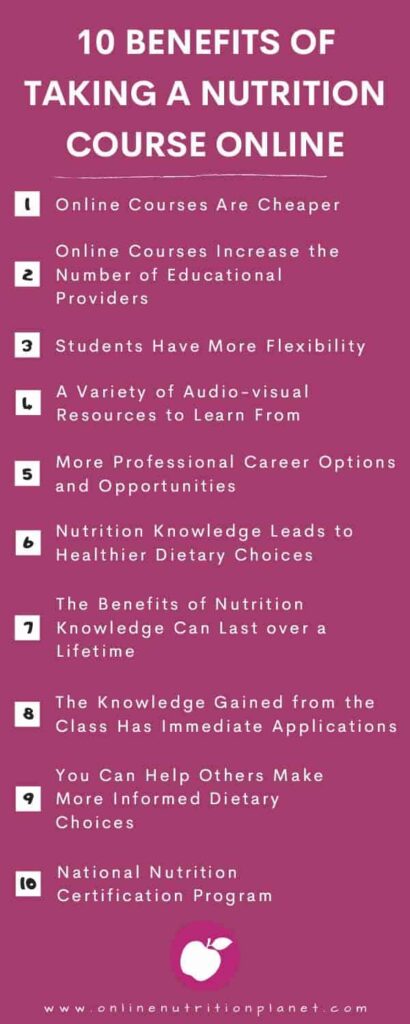In recent years, and especially throughout the COVID-19 pandemic, online classes and lectures have become an integral part of delivering educational material to millions of individuals across the globe. These classes enable both full-time and part-time students to learn about virtually any topic from the comfort of their home.
There is an increasing interest to learn about the health implications of different dietary choices and options. Online nutrition courses have become a cost-effective way to gain this valuable information and utilize it to improve personal health or work towards a degree in nutrition.
Check out our list of 10 benefits of taking a nutrition course online. The first five benefits address the financial and other advantages of online learning compared to in person lectures, while the remaining five benefits discuss the health implications and potential career opportunities stemming from online nutrition courses.
Article Contents
10 Benefits of Taking a Nutrition Course Online

Online courses are especially useful to individuals who are unsure about pursuing a degree in nutrition and do not want to pay the tuition and other fees to enroll at a university. Check out this list that discusses the 10 benefits of taking a nutrition course online.
Online Courses Are Cheaper
Relative to in-class learning, online courses save individuals money on both tuition and non-tuition related costs. While educators deliver the same material in online and in-person lectures, the latter do not require the physical costs associated with attending in person, which tends to decrease the direct tuition costs that students pay.
Aside from this, there are several non-tuition related costs that students avoid when taking online classes.
- For example, part-time students and those who live off-campus spend resources on gas, parking, or public transportation costs to access the physical location where the classes are held
- With online lectures, these costs can be avoided
For certain classes and certification programs in nutrition, online platforms don’t even charge tuition or any other class-related costs. This is a tremendous advantage to online learning that allows students who want to explore a potential career in nutrition to familiarize themselves with the educational material without incurring costs.
Finally, students who have dependents to take care of, be it their children, parents, or siblings, avoid the costs associated with hiring someone to take care of them while they attend classes in person. These costs can accumulate over time and prohibit otherwise motivated students from learning more about the implications of dietary choices.
Online Courses Increase the Number of Educational Providers
Once students are not constrained by the physical location of their colleges or universities, they can focus on taking classes from virtually any individual or institution that provides the educational material.
Nutrition courses and other similar courses that do not rely as much or at all on the use of physical equipment particularly lend themselves to online learning. Students can access the lectures from virtually any provider online and these providers usually offer a trial period during which students can leave if they are unsatisfied with the course.
In recent years, free massive open online courses (MOOC) have exploded in popularity and offer lectures in virtually every field, including dietary sciences. These and similar online platforms increase the number of educational providers and often offer world class education free of charge.
The combination of low to zero costs and the increased number of providers gives students the possibility to opt out if they are unsatisfied with the instructor or uninterested in the course material. This flexibility is exclusive to online learning.
Students Have More Flexibility
Unlike classes that are offered in the classroom, online courses are not scheduled at a set time and give students more flexibility and opportunities to learn at their own pace and schedule.
The benefits of added flexibility are especially important to students who have jobs or dependents to take care of and cannot as easily commit to a fixed classroom schedule. By taking the nutrition course online, students can access the material at their own schedule and more easily balance school requirements with job responsibilities.
Aside from balancing potential job and school responsibilities, online lectures also allow students to focus more closely on the concepts that they find more difficult to understand or master.
Finally, as the COVID-19 pandemic clearly illustrated, online learning has certain inherent advantages when it comes to dealing with pandemics, natural disasters, inclement weather, or any other form of interruption that prevents students from physically attending classes.
A Variety of Audio-visual Resources to Learn From
Lectures that require in person attendance are usually limited in the type of audio-visual resources that lecturers can rely on. Most are delivered in the typical format in which the lecturer stands in front of a blackboard or a screen and provides instructions to the class. As a result, there are limited options for interactive or engaging material.
On top of allowing students to learn at their own pace and schedule, online courses are more amenable to interactive learning that relies on different audio-visual resources.
- For example, students can interact with each other in discussion forums and discuss course materials and offer advice and suggestions
- Moreover, during live lectures, students may not properly hear or understand certain concepts and may be reluctant to interrupt the lecture and ask for clarification
In online courses, students can pause the lecture at any point, focus on specific lecture slides, or adjust the audio and visual features to help with comprehension.
More Professional Career Options and Opportunities
In today’s world of shifting job opportunities and requirements caused by disruptive technological advances, many individuals are unsure of their career choices. Taking an introductory course in nutrition is a cost-effective way to explore a potential career in dietary sciences.
In person classes are generally not available to students who are not actively enrolled in a online nutrition degree program at a given university. The monetary and time constraints associated with enrolling in a degree program prohibit otherwise interested students from exploring many career possibilities related to nutrition (e.g., sports, education, private practice).
Individuals who are unsure of their long-term career choices but wish to explore a potential career in nutrition can enroll in one or two online courses without fully committing to a two-year or a four-year degree. This is especially valuable to students who have full-time jobs and cannot physically attend in person lectures.
For students who wish to turn their passion for nutrition into a career, there are many opportunities in both private and public sectors (e.g., medical establishments, sports, restaurants, gyms, etc.).
Nutrition Knowledge Leads to Healthier Dietary Choices
In addition to benefits relative to in-person learning, taking a nutrition course online educates students about the health implications of their dietary choices and can lead them to live healthier and more productive lives. Many unsatisfactory health conditions that arise from poor dietary choices can be prevented (e.g., obesity, diabetes, etc.)
Online nutrition courses cover a wide range of topics (e.g., weight-loss techniques, vegetarian vs. carnivorous diets, sports nutrition, etc.). Depending on their interests and ambitions, some students may take these classes to primarily improve their dietary habits. Others, however, may be interested in obtaining a nutrition certification.
Whatever one’s ambitions, online nutrition courses give students the knowledge necessary to make more informed decisions about their own health. Those interested in advancing a more professional career as a online nutritionist can go on to take more advanced courses and obtain the certifications necessary to become a registered dietitian.
The Benefits of Nutrition Knowledge Can Last over a Lifetime
Some of the leading causes of death, such as diabetes, heart disease, or cancer are linked to one’s dietary choices. Any individual, regardless of age or current health conditions, can benefit greatly from understanding the health implications of consuming different types of food.
Online nutrition classes can introduce students to different types of diets, depending on one’s individual proclivities and interests.
- For example, individuals who are physically active and exercise on a daily or weekly basis can learn the best foods for recovery or muscle retention
- In addition, individuals who are less physically active but still want to remain in good shape can develop healthy eating habits and learn how many calories to eat to maintain their physical appearance
Online classes in nutrition offer a relatively cheap way to acquire important information that has health implications over an individual’s lifetime.
The Knowledge Gained from the Class Has Immediate Applications
Unlike other classes that can require several semesters or even years of learning before the knowledge can be practically applied, nutritional knowledge acquired through taking a nutrition course online has immediate benefits and applications.
For example, during trips to the grocery store, students will have a greater ability to understand the dietary guidelines that are printed on food items. In turn, this will lead them to make more informed and healthier purchases, as well as understand the long-term health trade-offs of purchasing certain food types.
Furthermore, meal preparation and home cooking may seem more appealing as a result of understanding the dietary guidelines and the implications of sugar, fiber, or fat content of different foods. This is also financially cost-effective as home-cooked meals are generally less expensive compared to restaurant meals.
You Can Help Others Make More Informed Dietary Choices
In addition to individual benefits that come from an online nutrition class, students can also help their friends and family make healthier nutritional choices. Enrolling in even one or two introductory nutrition classes equips students with enough knowledge to offer advice about the importance of diet for long-term health.
According to the Centers for Disease Control and Prevention, more than 20% of adults in U.S. states and territories are obese, while 73% are either overweight or obese. Obesity is to a large extent caused by poor dietary choices and the long-term negative health implications have been well documented.
Students who take online nutrition courses and make more informed dietary choices can inspire their loved ones’ to also take diet more seriously. This is especially so for those who are currently struggling with the health implications of consuming foods that are too processed or contain unhealthy fats and excessive sodium.
National Nutrition Certification Program
For students who are interested in pursuing a career in nutrition or obtaining a certificate, there are online options, such as the National Nutrition Certification Program (NNCP), that offer online classes and examinations completely free of charge.
There are several obvious benefits to this, both financial and non-financial.
First, as there are no costs to taking the class and the corresponding exam, students do not have to fear incurring tuition costs if they simply want to understand the basics of nutritional science.
Second, free online courses and examinations are especially useful to students who want to gain a more advanced understanding that can be used to obtain a certification in nutrition. Depending on their choice, students can use the certificate either as a part-time opportunity to supplement their incomes or a full-time job.
Finally, a major non-financial benefit of online lectures in nutrition is the knowledge that students gain, often free of charge. While online courses in other fields may also teach useful skills outside of the classroom, nutritional knowledge is especially important because it has health implications, which in turn can influence one’s productivity. You can start your journey of becoming an online nutrition coach today!
Conclusion
This article has discussed ten benefits of taking a nutrition course online. Five of the benefits are directly related to financial and other advantages of online learning relative to in person lectures. The remaining five outlined the health, career, and community benefits for individuals who choose to learn more about nutritional sciences.
Once you’ve gotten your first degree, you are ready to enroll in an online nutrition Master’s program to help you grow your career!




